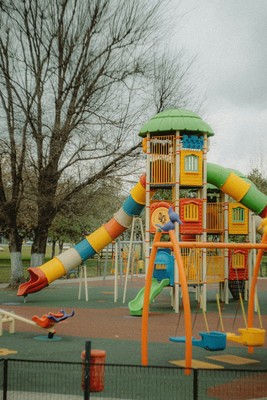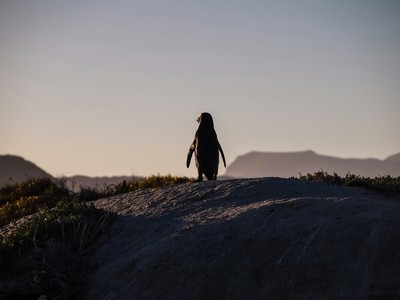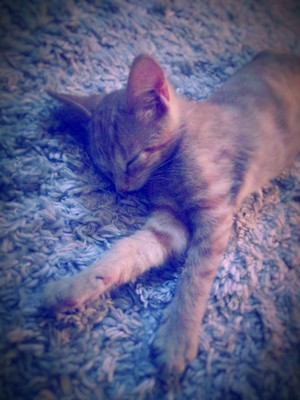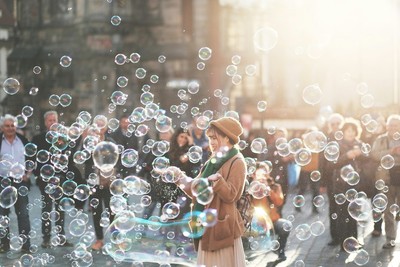The Double Rainbow: When ENFPs Encounter Other ENFPs
Rare doesn't mean that it never happens or that you can never find it. Just keep looking.
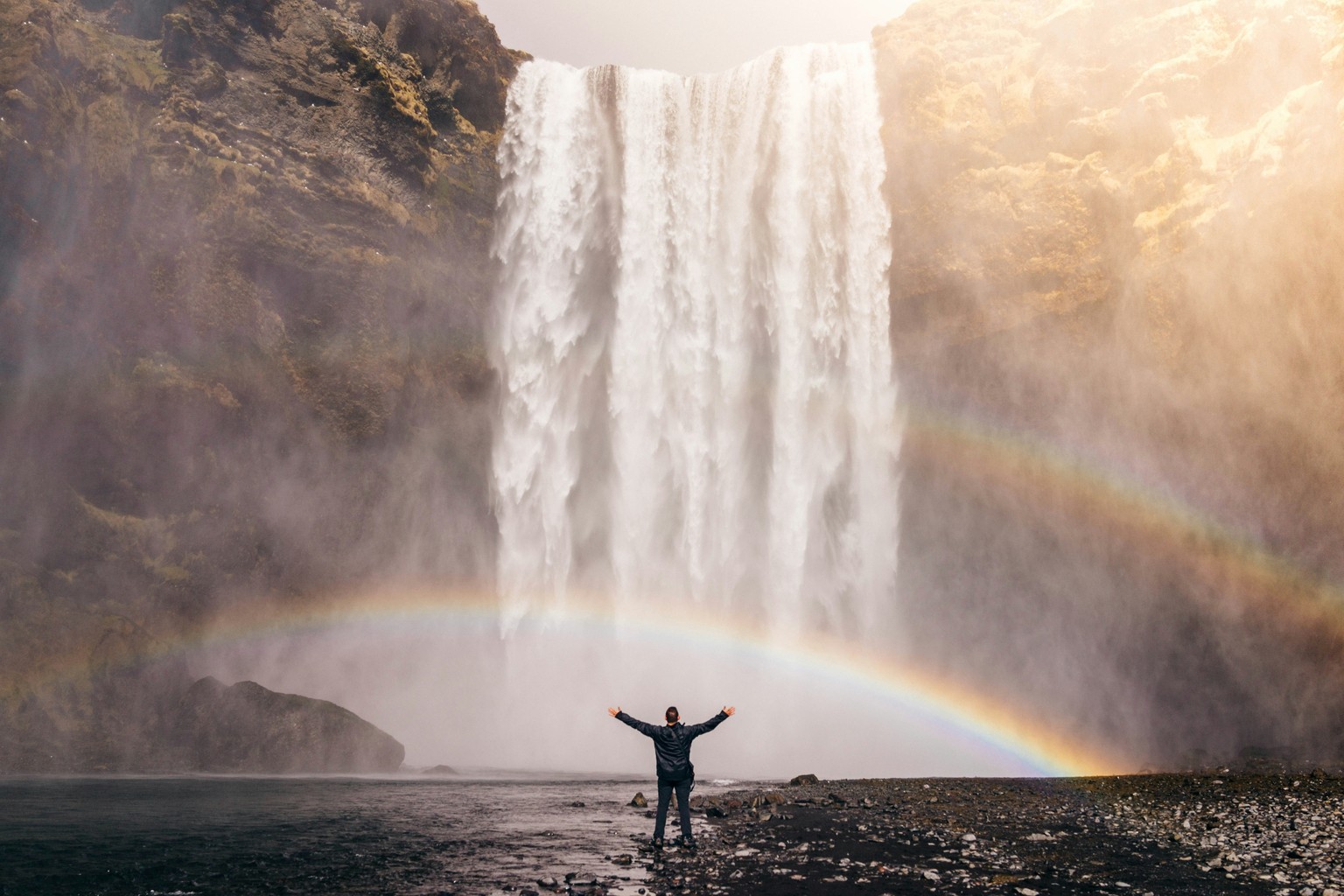
Sometimes it’s so strange to realize that I’m not the only person like me in this world.
For me, the experience of meeting another ENFP is often similar to that scene from Spiderman: Into the Spiderverse, where Miles Morales finds the current Spiderman of his dimension in the collider, fighting Green Goblin. Peter Parker saves Miles from being crushed in the middle of the fight, and as Peter Parker sets the teenage kid down on the platform (with a side question about his shoes being untied), the two of them experience vibrations—their “spidey senses,” which tell them that they are both spider-people. After the vibrations stop, Peter says,

“I thought I was the only one. You’re like me.”
Despite it being said on several websites that ENFPs make up at least 8% of the population, higher than the statistic for INFJs (which seems to fall around 1.5%), I have not encountered many ENFPs in my life. I’ve actually encountered at least as many, if not more, INFJs than ENFPs (my mom, for example, is an INFJ).
Maybe I’m just an INFJ magnet or something, I dunno. But come on guys, INFJs are not that rare. They’re just blending in. If you look closely, you’ll see lots of them.
The few ENFPs that I did know growing up were all adults anyway, so for most of my life I have always felt somewhat different; unique. I didn’t feel completely alienated, especially not after I learned about personality theory from my mom, but sometimes I didn’t really feel like I truly fit in. No one (that was my age, at least) really seemed to think or feel things the way I did.
Growing Up as an ENFP
When I was younger, before I reached the teens, I didn’t feel that different yet. Sure, I wasn’t into makeup and fashion or Barbie dolls and Monster High like so many other girls were, but I liked stuffed animals, Zuzu Pets, and Littlest Pet Shops, and I took ballet classes, so I could relate to plenty of other girls my age on at least a surface level.
(You probably can guess how old I am now, just from that paragraph.)
I had some friends I would play fun pretend games with too. Those were my favorite. I was always a creative kid. Most every kid likes to pretend in some way or another, so I didn’t have a hard time finding someone to practice wielding my creative mind with.
At the park I would imagine being the captain of a ship in space, my friends the crew mates (or one of them could be the captain if they wanted, I was happy as a crew mate), and the playground equipment our space ship. We would run away from aliens, or explore planets inhabited by small, green pigs (I was into Angry Birds at the time). If my friends came over to my house we would build tent forts or dress up in costumes, and the pretending would commence some more. My pet hamster would be an enchanted prince under a spell (despite the hamster actually being female), and we became dolphins or mermaids when we swam in someone’s backyard pool.
Then puberty hit. Suddenly, I felt very, very, awkward, and self-conscious. Were we too old for stuffed animals and pretend games now? Some of my friends thought so, especially now that we were 12 years old, the age where you finally reach adulthood. Now green pigs and pool mermaids were no longer fun—they were just silly, immature, even juvenile. Even after I stopped hanging out with those friends, it began to feel painfully embarrassing and childish acting out characters and playing pretend, so I stopped doing it with my new friends for the most part. I didn’t truly in my heart of hearts abandon it, I got into the Warrior Cats series and sometimes played warrior cat training games on the trampoline with my cousins and neighborhood girls, but that was really it.
A new form of acting had entered my life. I was still pretending to be something I wasn’t, but instead of it being for fun, it was to belong somewhere; to fit in.
However, I still needed some sort of outlet for my creative nature, so I turned to drawing, crafting, playing piano, and writing. Those were things other people accepted, and things that I wanted to do. When I reached the age of 15 and we moved to Missouri, the fun pretending had all but ceased, except when I was among family and friends I felt safe to show that part of me to. The part of me that wanted to talk in weird voices, make goofy videos and recordings, and pretend to be a ninja cat-girl or a unicorn, just for the hey of it. That part was otherwise buried under feelings of shame and embarrassment, coming out instead in the stories I was writing and imagining, and I hid those stories away for the most part too.
Imagination, the raw and authentic kind, wasn’t for sharing anymore.
Validation
Everyone—even types who are viewed by our society as the most normal, fitting-in people—needs some validation every once in a while. The rare moments that I did run into a fellow ENFP were wonderful. The feeling of being on the exact same radio station, the shared randomness that would just flow between us, the animated talking and hand gestures, and the sense of finally being understood in ways that I had never felt understood before, I wished it could last longer. They spoke my language.
They were people that were creative, like me. People that liked to talk and explore ideas, even the weirdest ones, people who were perfectly okay with getting completely off topic. People who had a random sense of humor and quite possibly a habit of making weird noises frequently. We usually really liked and respected each other.
With them, imagination was, maybe, for sharing again.
And maybe, if I’m surrounded by people like that, people who get me, then I can finally get myself It’s hard to know who you are when you’ve spent a lot of time trying to be what someone else wants you to be—thoughtful, considerate, logical, realistic, a person who gets the joke and who doesn’t take life too seriously, down to earth, someone with common sense, polite, someone who picks things up fast, someone who can party hard and have fun, someone completely normal and not too loud but loud whenever other people want me to be—no wonder my identity seems to be a conflicted mess now. I have not set boundaries. I have not really said, “This is me,” or “This is not me.” I opened my mind up a little too much, perhaps. In my attempt at charisma I gave up being my authentic self.
I’ve had to learn that not everyone will be a friend for me. (Besides, how would anyone have enough time in their life to meet and be friends with every single person on the planet?) Just because we have differences doesn’t mean we can’t be friends, but I don’t ever want to feel like I have to keep talking about dogs, or Harry Potter, or sports, or politics, or video games, or philosophy, or even last week’s “news”, just to keep someone interested. I have other thoughts and questions. About purple monkeys.
Would they sound different than normal monkeys? Would their fur be softer?
I imagine them having turquoise-y eyes. This (below) is a beautiful photo taken by Bob Brewer (Unsplash) that I recolored a little so you could sort of see what’s in my head.
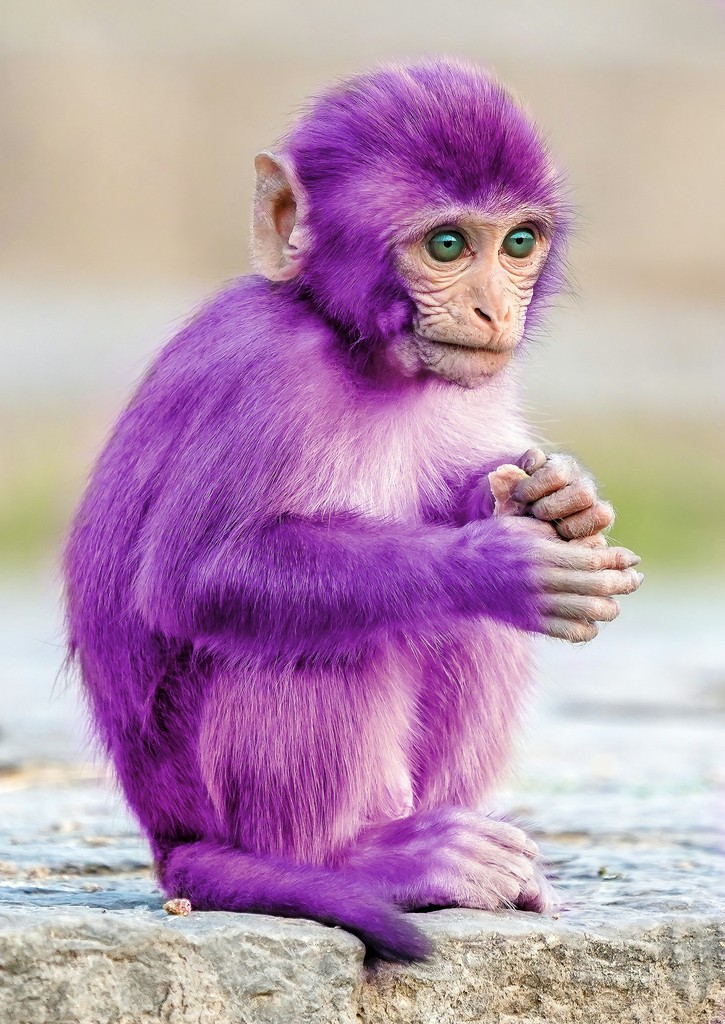
Wait. I’m not done. I have more thoughts and questions.
What if someone designed a phone with a screen on both sides, or shaped like a cylinder? What would a scarecrow with fairy wings look like? (Okay, you gotta look that one up, there's some cool stuff there that I didn't even think of) How difficult is it to write a nine-novel epic fantasy series? Why are cats afraid of cucumbers? Why do we hide smiles?
I don’t just want to talk about everyday life, but I also don’t just want to talk about perpetual motion and music theory. I want to talk about anything and everything, the big picture. I want to talk about the possibilities and what’s important to me. I want to go on a journey, on an adventure. Maybe I don’t want to travel outside of the country, but I want to travel to see friends and family here in the United States.
And when I tell other ENFPs about all these different things, they seem to get it. They nod their heads in understanding and even seem to relate. When that happens, I feel so understood and validated.
There have been times when I have truly thought I was the only one. But you’re like me.
I’m not alone. Somewhere, out there, others are trying to find themselves too, and just like me, they’re not sure how.
Tags: ENFP, AllPosts

